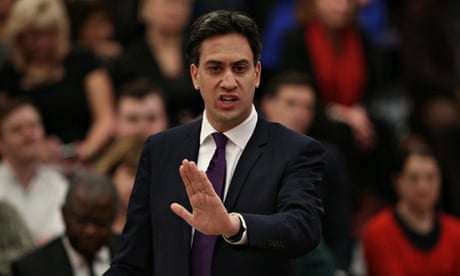I don’t particularly want to add to Ed Miliband’s troubles, because there’s no doubt that he has many already. But his speech on Thursday certainly won’t have diminished those troubles. Miliband is in a hole and he won’t, or can’t, stop digging. The odd thing is that some of his difficulties could be remedied fairly easily.
Forget plotting backbenchers: the Labour leader’s main problem is that the dialogue he’s attempting to have with the nation is just too negative. Even people who agree with his sentiments quite often don’t like the words he uses to express them. The writer India Knight says that some people are “radiator friends” and some people are “vampire friends”. Miliband is a vampire friend.
If you take it upon yourself to tell a total stranger how dreadful you know their life must be, then they’re likely to resent it – even if you have good grounds for assuming such a thing, even if you’ve arranged your face into the perfect expression of sad sympathy, as Miliband often does.
Very few people like to feel that they are the object of pity. If you make them feel that way, they’re likely, quite often, to edge away, looking instead for some more convivial company, someone who will take their mind off their troubles for a few hours. Even the people who are not themselves working three jobs in order to keep body and soul together find it depressing to think about.
Miliband, I’m afraid, sees every speech as a chance to tell a load of strangers how dreadful he knows their lives must be. That’s a lot of the reason why his personal rating is so appalling.
I doubt Miliband views himself as divisive, but he is. It’s actually quite disheartening, his vision of a Britain neatly split between the “powerful vested interests” and the downtrodden. The more Miliband insists that it’s him and the downtrodden against the “powerful vested interests”, the more unwinnable “the fight” he keeps on about seems.
There’s a fatal flaw to that approach: Miliband’s identification with the excluded, sincere as it may be, doesn’t come across as authentic. It’s cheap and easy to point out that Miliband is not “a man of the people”, but an Oxbridge-educated career politician. But the fact remains, his leadership is the result of Labour’s transformation from old to New.
Miliband may believe himself to be a socialist. But Labour is a social democratic party now, with the kind of leader you’d expect a social democratic party to have. Try as he might to escape New Labour, Miliband is very much its product. Labour frets about having lost its core vote without ever quite acknowledging why. Labour lost its core vote because it lost its core ideology. Everyone knows it. Except, seemingly, Labour.
I saw one telling glimpse of the “decent” man Miliband and his supporters keep telling us he is. (Again, the vast majority of people are “decent” and don’t much love the implication that the quality is fantastically precious and rare.) This came during the Q&A session when Miliband was asked about immigration.
He explained how he could view immigration as a positive benefit for Britain, yet still understand when people saw it as wholly negative. Miliband just said, essentially, that different people have different perspectives, according to their circumstances, and that this is perfectly reasonable.
Quite right. A good leader should strive for the things that unify different perspectives, that bring very different people together and help them to find common cause. Much of the reason why Britain is sick of two-party politics is because an oppositional duopoly is by its nature divisive.
The left doesn’t need to be told, over and over again, how socially debilitating and unfair inequality is. We know already. The challenge is getting the right to believe that inequality is corrosive, and that it would be really nice if we could all rally round to fix it, because this country is closer than many to being a very cool place indeed.
Miliband, though? Miliband talks as though Britain is virtually unsalvageable. Even if that pessimistic view rings true, endlessly repeating it spreads only further pessimism, which is the last thing people already struggling actually need.
When even the people on the down side of the equality equation don’t feel inspired by your leadership, you’re doing something wrong. Miliband does himself no favours by blaming others for all his troubles. Of course, there are plenty of influential people who don’t want Labour back in power. Of course – that’s politics. But Miliband’s problems are more fundamental than that.
Labour may not be in a position to change its leader before the next election. But Labour’s leader has time to change his attitude. Miliband needs to throw caution to the wind and have a go at communicating it. No one wants to listen to the rhetoric of Pollyanna, but nobody cheers at the sight of Eeyore behind a lectern, either.

